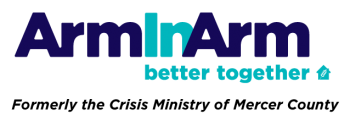“Homelessness affected several areas of my life,” says Michael. “I wasn’t providing for my five-year-old daughter. I wasn’t in contact with my family, and they worried about me as I moved from house to house with friends or to a shelter. Homelessness has been intrinsic to my life since the beginning,” he adds, starting with abandonment as a baby by his mother and being raised in her mother’s crowded home.

It comes as no surprise to anyone who talks with Michael that he excelled academically. Still, despite achieving excellent grades, his volatility—a result of instability at home—got the best of him and he was expelled. He eventually obtained his GED and continued with college studies for a time, Latin being among his courses. He enrolled in the U.S. Marine Corps from 1987 to 1992, and is a Gulf War veteran. Michael has since held jobs in food prep and other fields, but none for any meaningful duration.
“I have really been tested,” Michael says. His clothes have been stolen more than once. His money, too. But he considers those minor losses compared to the prized possession that disappeared with them: his official Marine Corps portrait. That hurt. But not enough to give up.
While staying in the Rescue Mission of Trenton, he would leave daily at 6 a.m. and carry his clothes and other belongings with him until he returned for the evening. He considered this his cross to bear, giving an example: “Let’s say you have a job interview at 9 a.m., but you’ve been out walking since 6 a.m. Not only will you have no place to put your clothes during your interview, but you won’t look or feel your best. All of these things added up. But I made do. Faith helped me through.”
Over time, Michael stabilized his mental health with help from Greater Trenton Behavioral Health, Princeton House, and the Rescue Mission. His next step was to stabilize his living situation.
He came to the Crisis Ministry for help. Our rapid re-housing program provided the foundation for his next step toward self-sufficiency: an apartment
But there was more in store when he arrived: “When I applied for security deposit help and was told there were things that the Crisis Ministry needed help with, a bell went off for me.”
Michael has found a way to put his skills and abilities to work, “to be of use,” as he puts it. He provides 10 paid hours of service a week to the Crisis Ministry as the facilities assistant we desperately needed and additionally serves as a volunteer, a combination that helps him to focus on polishing habits like punctuality, communication, and confidence as he prepares to pursue training to become a Mental Health Associate for a provider such as Princeton House. “I’ve got big dreams, but they can be accomplished only small steps at a time,” he says. “I’m mapping the course by which I can get there.”
He describes a recent scene: “I sat outside the Dunkin’ Donuts with my coffee and experienced a feeling of community in the sense of all parts coming together. I no longer felt like some statistic, but instead felt a sense of peace.” About a week later, he held another cup of coffee as he sat in front of the same Dunkin’ Donuts. Only this time what entered Michael’s mind was, “My goodness, I have a lot to do!”
